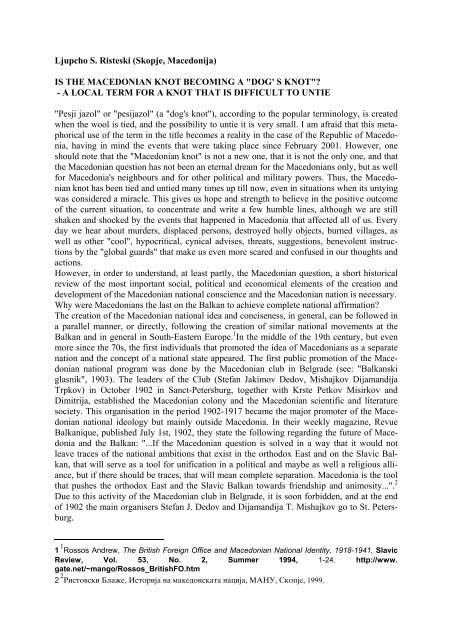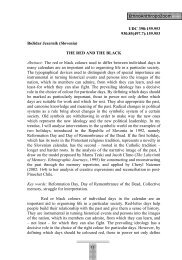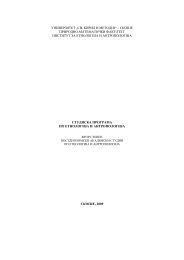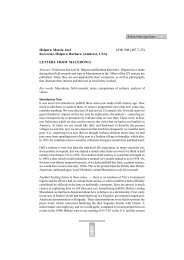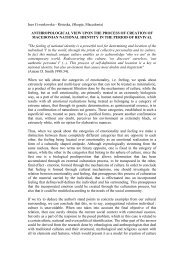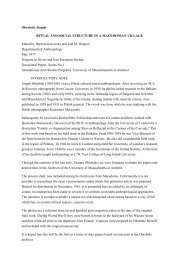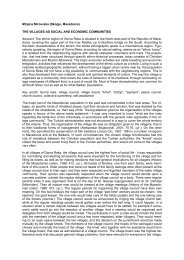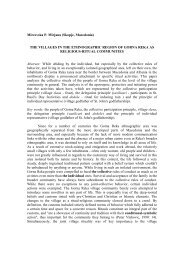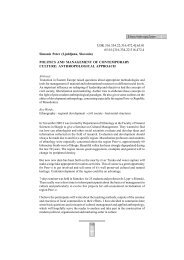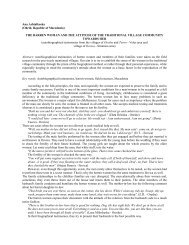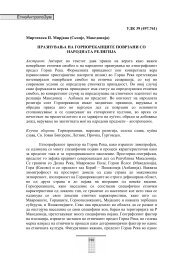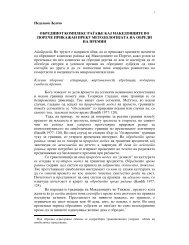Risteski S.Ljupcho (Skopje, Macedonija), Is The Macedonian Knot ...
Risteski S.Ljupcho (Skopje, Macedonija), Is The Macedonian Knot ...
Risteski S.Ljupcho (Skopje, Macedonija), Is The Macedonian Knot ...
Create successful ePaper yourself
Turn your PDF publications into a flip-book with our unique Google optimized e-Paper software.
<strong>Ljupcho</strong> S. <strong>Risteski</strong> (<strong>Skopje</strong>, <strong>Macedonija</strong>)<br />
IS THE MACEDONIAN KNOT BECOMING A "DOG' S KNOT"?<br />
- A LOCAL TERM FOR A KNOT THAT IS DIFFICULT TO UNTIE<br />
"Pesji jazol" or "pesijazol" (a "dog's knot"), according to the popular terminology, is created<br />
when the wool is tied, and the possibility to untie it is very small. I am afraid that this metaphorical<br />
use of the term in the title becomes a reality in the case of the Republic of Macedonia,<br />
having in mind the events that were taking place since February 2001. However, one<br />
should note that the "<strong>Macedonian</strong> knot" is not a new one, that it is not the only one, and that<br />
the <strong>Macedonian</strong> question has not been an eternal dream for the <strong>Macedonian</strong>s only, but as well<br />
for Macedonia's neighbours and for other political and military powers. Thus, the <strong>Macedonian</strong><br />
knot has been tied and untied many times up till now, even in situations when its untying<br />
was considered a miracle. This gives us hope and strength to believe in the positive outcome<br />
of the current situation, to concentrate and write a few humble lines, although we are still<br />
shaken and shocked by the events that happened in Macedonia that affected all of us. Every<br />
day we hear about murders, displaced persons, destroyed holly objects, burned villages, as<br />
well as other "cool", hypocritical, cynical advises, threats, suggestions, benevolent instructions<br />
by the "global guards" that make us even more scared and confused in our thoughts and<br />
actions.<br />
However, in order to understand, at least partly, the <strong>Macedonian</strong> question, a short historical<br />
review of the most important social, political and economical elements of the creation and<br />
development of the <strong>Macedonian</strong> national conscience and the <strong>Macedonian</strong> nation is necessary.<br />
Why were <strong>Macedonian</strong>s the last on the Balkan to achieve complete national affirmation?<br />
<strong>The</strong> creation of the <strong>Macedonian</strong> national idea and conciseness, in general, can be followed in<br />
a parallel manner, or directly, following the creation of similar national movements at the<br />
Balkan and in general in South-Eastern Europe. 1 In the middle of the 19th century, but even<br />
more since the 70s, the first individuals that promoted the idea of <strong>Macedonian</strong>s as a separate<br />
nation and the concept of a national state appeared. <strong>The</strong> first public promotion of the <strong>Macedonian</strong><br />
national program was done by the <strong>Macedonian</strong> club in Belgrade (see: "Balkanski<br />
glasnik", 1903). <strong>The</strong> leaders of the Club (Stefan Jakimov Dedov, Mishajkov Dijamandija<br />
Trpkov) in October 1902 in Sanct-Petersburg, together with Krste Petkov Misirkov and<br />
Dimitrija, established the <strong>Macedonian</strong> colony and the <strong>Macedonian</strong> scientific and literature<br />
society. This organisation in the period 1902-1917 became the major promoter of the <strong>Macedonian</strong><br />
national ideology but mainly outside Macedonia. In their weekly magazine, Revue<br />
Balkanique, published July 1st, 1902, they state the following regarding the future of Macedonia<br />
and the Balkan: "...If the <strong>Macedonian</strong> question is solved in a way that it would not<br />
leave traces of the national ambitions that exist in the orthodox East and on the Slavic Balkan,<br />
that will serve as a tool for unification in a political and maybe as well a religious alliance,<br />
but if there should be traces, that will mean complete separation. Macedonia is the tool<br />
that pushes the orthodox East and the Slavic Balkan towards friendship and animosity...". 2<br />
Due to this activity of the <strong>Macedonian</strong> club in Belgrade, it is soon forbidden, and at the end<br />
of 1902 the main organisers Stefan J. Dedov and Dijamandija T. Mishajkov go to St. Petersburg.<br />
1 1 Rossos Andrew, <strong>The</strong> British Foreign Office and <strong>Macedonian</strong> National Identity, 1918-1941, Slavic<br />
Review, Vol. 53, No. 2, Summer 1994, 1-24. http://www.<br />
gate.net/~mango/Rossos_BritishFO.htm<br />
2 2 Ristovski Bla`e, <strong>Is</strong>torija na makedonskata nacija, MANU, <strong>Skopje</strong>, 1999.
<strong>The</strong>re they join the work of the <strong>Macedonian</strong> scientific and literature society, where on 12<br />
November 1902 the Memorandum is published, and is distributed to the Russian Government<br />
and the Council of the St. Petersburg's Slavic Charity Society. In it they say: "...At first<br />
glance our idea for free Macedonia in a national, political and religious sense could seem as<br />
an utopia, it may appear that we are trying to create artificially something that does not exist,<br />
that using the geographical term Macedonia we want to create an ethnic term or, in other<br />
words, that we are trying to create in an artificial way a <strong>Macedonian</strong> nation. Macedonia in the<br />
frames defined at the conference in Tzarigrad has around 2.500.000 inhabitants, of which<br />
1.200.000 - 1.500.00 are inhabitants of non-Slavic origin, then a huge number of Turks<br />
600.000 - 800.000, and the rest are Greeks, Vlahs, Jews and others, so that in the future Macedonia,<br />
liberated in political, national and spiritual sense, the major role in the social and<br />
political life of the country will be carried by the Slavic element, that at the moment, unfortunately,<br />
is separated into three national groups, and in religious sense divided into: supporters<br />
of the Patriarchy, of the Bulgarian Egzarhy, Catholics, Protestants and Muslims, and if in the<br />
future this Slavic population does not succeed in unifying into one compact group so that it<br />
can gain dominance when it comes to other nationalities, then one could expect that the destiny<br />
of Macedonia will be in the hands of its enemies.<br />
Different national and religious propaganda have understood well the significance of the<br />
Slavic population for the destiny of Macedonia and have dedicated all of its forces to gain<br />
these people's support..." 3 .<br />
When it comes the comprehension of national freedom, the Memorandum states: "...We define<br />
national freedom in terms of removing all national propaganda from Macedonia and<br />
raising one of <strong>Macedonian</strong> dialects to the level of a general <strong>Macedonian</strong> official language..."<br />
4 . <strong>The</strong> presented data are crystal clear proofs that the <strong>Macedonian</strong> intellectuals of<br />
that time have created and expressed the idea of national independence and introduced one of<br />
<strong>Macedonian</strong> dialects as an official <strong>Macedonian</strong> language, but most probably the problem of<br />
its real implementation in Macedonia was the social and political atmosphere. In that sense,<br />
the reasons for the delay of the creation of the <strong>Macedonian</strong> national state are numerous, and<br />
they are all related to the social and political contexts that prevented its creation at the time<br />
when at the Balkan other national states were formed.<br />
Primarily, Macedonia, until the final fall of the Turkish Empire, was situated in the central<br />
part of the Balkans. That fact has minimised all geopolitical, social and cultural preconditions<br />
for the <strong>Macedonian</strong> population to be able to express publicly, and to realise, its national<br />
needs that were already promoted by the intelectuals-<strong>Macedonian</strong>s in Belgrade, Sofia and S.<br />
Petersburg. Macedonia was not only one of the central provinces of Turkey at the Balkans,<br />
but at the same time it was never in the buffer zone between the Empire and other states,<br />
something that could result with a more effective flow of new ideas among the population.<br />
On the other hand, in Turkey, according to the regulations of the Sherijat law, recognised<br />
faits instead of nations, so that, after the Bulgarian Exarhy was founded in 1870, the question<br />
of re-creation of the Ohrid Archibishopry was closed. Thus, the <strong>Macedonian</strong>s could choose<br />
between the Greek Patriarchy and the Bulgarian Exarchy. Having in mind the Slavic character<br />
and the closeness of the language, it is understandable why <strong>Macedonian</strong>s were in favour<br />
of the Exarchy than of the Patriarchy, since the latter was performing its religious services in<br />
Greek, which was for <strong>Macedonian</strong>s a completely unknown language. This is how for the<br />
Turkish official administration <strong>Macedonian</strong> population becomes "Bulgar millet", and they<br />
3 3 Ristovski Bla`e, <strong>Is</strong>torija na makedonskata nacija, MANU, <strong>Skopje</strong> 1999, 270-271.<br />
4 4 Ristovski Bla`e, <strong>Is</strong>torija na makedonskata nacija, MANU, <strong>Skopje</strong> 1999, 270-273.
were presented as Bulgarians not only in the statistic documents of the Empire, but abroad as<br />
well. 5<br />
This is how a process of powerful propaganda started.<br />
At the beginning of the 20th century, a part of the Bulgarian intelligence was aware about the<br />
processes of national awakening of the <strong>Macedonian</strong>s in Macedonia, and the Pirin part of Macedonia<br />
seemed to be the most interesting. This is why E. Sprostranov in November 1903<br />
sent a letter to the Bulgarian Prime Minister Petrov, regarding the continuous manifestations<br />
of the <strong>Macedonian</strong> national feeling, saying: "As you can see Mr. Minister, such ideas that are<br />
widely accepted by the <strong>Macedonian</strong> population, are not to be underestimated and one should<br />
pay attention to them. If I add that the ones who are speaking in favour of <strong>Macedonian</strong> separatism<br />
are working very hard and with enthusiasm to print books, dictionaries, schoolbooks,<br />
historical handbooks and the grammatical of <strong>Macedonian</strong> language, then you can understand<br />
the danger that the Bulgarian idea is facing in Macedonia. I am convinced that in a very short<br />
time, with the exemption of the <strong>Macedonian</strong> intelligence that has been educated in Bulgarian<br />
schools, the population will reject Bulgarian language and will accept the <strong>Macedonian</strong>, that is<br />
their native language, since there will be no need to study it, as in the case with the Bulgarian<br />
language..." 6 .<br />
In 1912 the Balkan states - Serbia, Bulgaria, Greece and Monte Negro join in a military union<br />
for fighting against Turkish authority. Numerous <strong>Macedonian</strong> national activists that have<br />
worked outside Macedonia decided to come to Macedonia and try to directly influence the<br />
destiny of the country. Thus, Krste Misirkov went to Southern Macedonia, Dimitrija Chupovski<br />
to Sofia and Veles, and d-r Gavril Konstantinovich to Cetinje. D. Chupovski, when he<br />
established a contact with the <strong>Macedonian</strong> emigration in Sofia arrives in Veles, where at the<br />
dinner on the holiday St. Arhangel Michail, in the family of Angel Korobar, the General <strong>Macedonian</strong><br />
Conference is held. That evening a decision is made that D. Chupovski and P. Poparsov<br />
should be sent to Paris and to the Ambassador's peace conference in London, so that<br />
they can work in the name of the <strong>Macedonian</strong>s, so that the unity of the already destroyed Macedonia<br />
would be kept. 7 After the first Balkan war (1912/13), the appetites for conquering of<br />
the "liberated" parts, mainly the territory of Macedonia, leads to war between them - the second<br />
Balkan war (1913). After the Bucharest peace agreement of August 1913 Macedonia was<br />
divided. According to the Agreement, Greece took Southern Macedonia and the coast (Aegean<br />
Macedonia), Serbia the Northern and Central part (Vardar) and Bulgaria - Eastern Macedonia<br />
(Pirin Macedonia).<br />
<strong>The</strong> Vardar part is in the frames of the Kingdom of SCS, as Vardarska Banovina, Southern<br />
Serbia, and the <strong>Macedonian</strong>s were called "South-Serbians". From a current scientific perspective,<br />
one could conclude that there are enough documents according to which one can<br />
understand that the interior policy of the Kingdom of SCS, later on known as the Kingdom of<br />
Yugoslavia, had only one goal, to destroy all signs of Macedonism, through planed actions<br />
and activities of the state bodies, through different programs for denationalisation of the<br />
population, colonisation, social and economic discrimination and assimilation based upon<br />
total control of the educational systems and the cultural and intellectual life. This is how the<br />
Vice-consul of Britain, C. L. Blakeney describes the situation in Vardar Macedonia, in his<br />
report to the British Foreign Office.<br />
5 5 Ristovski Bla`e, <strong>Is</strong>torija na makedonskata nacija, MANU, <strong>Skopje</strong> 1999, 270-677-678.<br />
6 6 Donski Aleksandar, Ilindencite so maka go u~ele bugarskiot jazik,<br />
http://www.gate.net./`mango/Narodna_Volja.html<br />
7 7 Ristovski Bla`e, <strong>Is</strong>torija na makedonskata nacija, MANU, <strong>Skopje</strong> 1999, 270-382-383
"It is very well for the outsider to say that the only way the Serb could achieve this<br />
[control of Vardar Macedonia] was by terrorism and the free and general use of the big stick.<br />
This may be true, as a matter of fact one could say that it is true... On the other hand, however,<br />
it must be admitted that the Serb had no other choice... He had not only to deal with the<br />
brigands but olso with a population who regarded him as an invader and unwelcome foreigner<br />
and from whom he had and could expect no assistance." 8<br />
In this period, in the Vardar part of Macedonia, as a result of a colonisation of mainly<br />
Serbian population in many villages, significant changes start to happen, which aimed towards<br />
destroying the ethnic core of <strong>Macedonian</strong>s. In the frames of the Kingdom of Yugoslavia,<br />
a separate state department for colonisation was formed, a part of the Ministry of Agricultural<br />
Reform and Agriculture, leaded by people with experience in the field of ethnic processes:<br />
one of the heads of this department was the famous Serbian ethnologist Sreten Vukosavljevic.<br />
<strong>The</strong> colonised villages in Macedonia were renamed, and instead of their <strong>Macedonian</strong><br />
or Turkish names, they got Serbian ones or names of one of some of the famous Serbian<br />
activists (Sretenovo, in the honour of Sreten Vukosavljevic, Alexandrovo, in the honour of<br />
king Alexandar, Karadzordzevo, in the honour of Karadzordzevic and many others).<br />
Here is an extract of the letter that the British Minister in Belgrade, R. I. Cambell sent<br />
to the Secretary of the Foreign Office in 1940, regarding the politics of colonisation in the<br />
Kingdom of Yugoslavia:<br />
"Since the occupation by Serbia in 1913 of the <strong>Macedonian</strong> districts, the Government<br />
has carried out in this area, with greater or lesser severity, a policy of suppression and assimilation.<br />
In the years following the Gread War land was taken away from the inhabitants<br />
and given to Serbian colonists. <strong>Macedonian</strong>s were compelled to change their names and the<br />
Government did little or nothing to assist the economic development of the country..." 9 .<br />
Having in mind the few fortunate circumstances present in the Vardar's Banovina, for<br />
example the bad natural adaptability of the population, the political and economic conditions,<br />
especially the behaviour of the Bulgarian authorities after their entrance into Macedonia, and<br />
above all, the chauvinism of the <strong>Macedonian</strong>s towards strangers, today one can not notice big<br />
traces that could be described as a result of this colonising politics in this part of Macedonia.<br />
<strong>The</strong> major part of the colonised population, even in the first couple of years after their arrival,<br />
due to the extremely different natural, geographical and cultural conditions, could not adapt<br />
so that they started to come back to their native homes. Another big part of the colonised<br />
Serbs, were expelled after the entrance of the Bulgarian army during the Second World War,<br />
when the Serbian names of the villages were changed into Bulgarian, and the few villages<br />
that remained in Macedonia, according to our own field investigations, were already in a process<br />
of assimilation into their <strong>Macedonian</strong> ethnic environment, although one could still notice<br />
some elements of their own ethnic characteristics. 10<br />
8 8 FO371/14316, A. Henderson (Belgrade) to N. Henderson, 9 May 1930, Enclosure 2, "Memorandum<br />
by Vice-Consul Blakeney". Citirano spored Rossos Andrew, <strong>The</strong> British Foreign Office and<br />
<strong>Macedonian</strong> National Identity, 1918-1941, Slavic Review, Vol. 53, No. 2, Summer 1994, 1-24.<br />
http://www. gate.net/~mango/Rossos_BritishFO.htm<br />
9 FO371/29785, Campbell (Belgrade) to Halifax, 6 january 1941. Citirano spored Rossos Andrew, <strong>The</strong><br />
British Foreign Office and <strong>Macedonian</strong> National Identity, 1918-1941, Slavic Review, Vol. 53, No. 2, Summer<br />
1994, 1-24.<br />
http://www. gate.net/~mango/Rossos_BritishFO.htm<br />
10 <strong>Risteski</strong> Qup~o S. Procesite na interakcija i akulturacija kaj koloniziranoto srpsko<br />
naselenie vo Makedonija vo periodot pome|u dvete svetski vojni, Razvitok, 1, Bitola 1997, 1-<br />
25.
<strong>The</strong> Pirin part of Macedonia starting from 1913 was in the frames of Bulgaria. Concerning<br />
the national identity of the population of Pirin Macedonia, as well as concerning the<br />
real activities in this part of the country, especially illustrative are the reports that were published<br />
in the annual report 1922 of the British Legation that refers to Bulgaria. Here, when it<br />
comes to Pirin Macedonia, one can read that: "the autonomous kingdom of Macedonia", a<br />
"Bulgarian sovereignty over district --- is purely nominal, and, such as it is, is resented by irredentism<br />
<strong>Macedonian</strong> element no less strongly than is that of the Serb-Croat-Slovenian<br />
Government over the adjacent area within their frontiers". 11<br />
<strong>The</strong> public negative attitude towards the Bulgarian state and the requirements for unification<br />
and independence of Macedonia are reflected in a letter that the Bulgarian Minister<br />
W. A. F. Erskine sent to Lord Curzon in 1922, where he draws attention to an article published<br />
in the magazine Macedonia, which reads:<br />
"<strong>The</strong> <strong>Macedonian</strong>s to follow the example of the Irish, who after a bitter struggle lasting<br />
through centuries, have succeeded in gaining their autonomy. <strong>The</strong>ir country is free today.<br />
Ours, too, will be free if we remain faithful to our own traditions of struggle and if we take as<br />
our example the lives of people, who, like the Irish, have never despaired of the force of<br />
right'". 12 <strong>The</strong> Greek government, as well as the governments of other neighbouring countries,<br />
is performing relatively similar activities on the field of "national politics" in Aegean Macedonia.<br />
Some authors estimate that this politics was more intensive and more violent than the<br />
politics in Bulgaria and Yugoslavia. <strong>The</strong> biggest changes of the ethnic map of Aegean Macedonia<br />
happened during 1919 when Greece and Bulgaria signed an agreement of "exchange of<br />
population". As a result of this agreement around 60.000 <strong>Macedonian</strong>s have "voluntarily" left<br />
their native homes and were displaced in Bulgaria. Soon a similar agreement is signed between<br />
Greece and Turkey. Around 40.000 <strong>Macedonian</strong>s, some of them Muslim by religion,<br />
around 300.000 Turks, left Greece, and around 700.000 Greeks from Turkey, the Asia Minor<br />
part of Greece and the islands moved to Aegean Macedonia. 13 Thus, in the period of 1912 -<br />
1928, according to Stojan Kiselinovski, 80.000 <strong>Macedonian</strong>s have been expelled from Aegean<br />
Macedonia and at the same time 620.000 Greeks were colonised 14 . During the 20s the<br />
Greek state has changed all the names of the cities, villages, all toponym that were <strong>Macedonian</strong><br />
were changed into Greek ones (1926), and all ancient-Slavic signs in the churches and<br />
on the frescoes were deleted (1927), while the <strong>Macedonian</strong> language was forbidden even for<br />
private use. 15 As a support of the above mentioned, we will note some of the changed names<br />
of the toponym in Aegean Macedonia. <strong>The</strong> cities: Voden-Edessa, Rupishta - Agos Orestikon,<br />
S'botksa - Aridea, Postlo - Pella, Libanovo - Eginon, Larigovo - Arnea, Ostrovo - Arnisa,<br />
Vrtikop - Skidra, Valovishta - Sidirokastron; rivers: Vardar - Axios, Bistrica - Alliakmon,<br />
Galik - Erigon, the lake Ostrovo - Limni Arnisis, the lake Gorchlivo - Pikrolimni. <strong>The</strong> re-<br />
11 FO371/8568,22. http://www. gate.net/~mango/Rossos_BritishFO.htm<br />
12 FO371/7375, Erskine (Sofia) to Curzon, 25 january 1922. Harold Nicolson commented: "<strong>The</strong>re is less disparity<br />
between the Irish and <strong>Macedonian</strong> temperament than might be supposed". (Minute, 1 February 1922).<br />
Citirano spored Rossos Andrew, <strong>The</strong> British Foreign Office and <strong>Macedonian</strong> National Identity, 1918-1941,<br />
Slavic Review, Vol. 53, No. 2, Summer 1994, 1-24.<br />
http://www. gate.net/~mango/Rossos_BritishFO.htm<br />
13<br />
Daskalovski Zhidas, Minority Rights Case Study : <strong>Macedonian</strong>s in Greece<br />
http://www.gate.net/`mango/Kimlika.html<br />
1 14 Kiselinovski Stojan, Etni~kite promeni vo egejskiot del na Makedonija (1913-1940),<br />
INI, <strong>Skopje</strong> 1981.<br />
15<br />
Daskalovski Zhidas, Minority Rights Case Study : <strong>Macedonian</strong>s in Greece<br />
http://www.gate.net/`mango/Kimlika.html
gions of Voden - Nomos Pelis, Gumendze - Eparhia Paeonis, Valovishta - Eparhia Sindikis,<br />
Zihnensko - Eparhia Philidos and others.<br />
In his article on the activities of the British Foreign Office regarding the national<br />
questions at the Balkan, Andrew Rossos says: "But while the Foreign Office endeavoured to<br />
avoid dealing with the national dimension and implications of the problem until as late as<br />
1930, by the mid-1920s its position was already being questioned and challenged by Foreign<br />
Office officials in the Balkans, and was becoming untenable." <strong>The</strong> relation of the Balkan<br />
states towards <strong>Macedonian</strong>s until the beginning of the Second World War can be seen from a<br />
letter that has been sent in 1926 by H. Smith. In it he says: "It was difficult to reconcile the<br />
use of three different terms - Slavophone Greeks, Old Serbians and Bulgarians - when referring<br />
to a people who called themselves Makedonci and spoke macedonian or dialects of it." 16<br />
After the IIWW, Vardar Macedonia, according to its first constitution 1946, was established<br />
as a People's Republic, with its own independence, however still in the frames of<br />
the Yugoslav Federation. Certain social and political changes happened in other parts of Macedonia<br />
as well, with a remaining unfulfilled wish to become a part of one state. In Pirin Macedonia,<br />
after the capitulation of Bulgaria and the events of September 9th 1944, a relatively<br />
relaxed social and political climate was created. At the same time the Communist party of<br />
Bulgaria, with its leader Georgi Dimitrov, at the 10th Meeting of the Central Committee (9th<br />
of August, 1946), officially has recognised <strong>Macedonian</strong> nation and the right of Pirin Macedonia<br />
for unification with the People's Republic of Macedonia. <strong>The</strong> demographic data and the<br />
official statistics of that period show that the majority of the population in Pirin Macedonia<br />
identified itself as <strong>Macedonian</strong>. This was confirmed by the census of 1956, when 63,7% of<br />
the inhabitants have declared themselves <strong>Macedonian</strong>s. After the recognition of the <strong>Macedonian</strong><br />
nation and <strong>Macedonian</strong> language, in Pirin Macedonia a new period of cultural autonomy<br />
and affirmation of the <strong>Macedonian</strong> national, cultural and linguistic values started. Around<br />
32.000 pupils in Pirin Macedonia at that time studied in <strong>Macedonian</strong> language, and in 1947 in<br />
Gorna Dzumaja (today Blagoevgrad) the first <strong>Macedonian</strong> library and reading room was<br />
opened. This pleasant period for the development of the <strong>Macedonian</strong> national idea in Pirin<br />
Macedonia unfortunately ends very soon, with the Resolution of the Inform-bureaeu, in 1948,<br />
and especially in 1956, when the Bulgarian official state politics has drastically changed, negating<br />
the existence of the <strong>Macedonian</strong> nation and language, an attitude which with smaller<br />
or bigger variations is still valid, as an official attitude of the Republic of Bulgaria towards<br />
the Republic of Macedonia.<br />
In Aegean Macedonia, during the IIWW numerous military and political organisations<br />
were formed, with clear national characteristics of the <strong>Macedonian</strong>s that used to leave<br />
there. In 1942 in the region of Voden the <strong>Macedonian</strong> anti-fasistic organisation was formed,<br />
and in 1943 in the region of Kostur and Lerin the Slavic national-liberation front was formed.<br />
Aimig towards "seducing" the <strong>Macedonian</strong>s to fight on their side, the Communists of Greece<br />
have promised them that their ethnic minority rights will be guaranteed, and they have promised<br />
a wide autonomy for Aegean Macedonia. Contrary to this promise, in 1949 the Democratic<br />
Army of Greece (DAG) is assisting the new exodus of <strong>Macedonian</strong>s. <strong>The</strong> number of<br />
refugees from the Aegean part could be estimated around 100.000 people, of which 28.000<br />
children.<br />
Immediately after the Civil war in Greece, the state authorities started to imply numerous<br />
methods for assimilating the <strong>Macedonian</strong>s that were left in the Aegean part. Since<br />
1950 in the region of Lerin many kindergartens were opened to teach the children in Greek.<br />
16 FO371/11337, Kennard (Belgrade) to H. Smith, Enclosure , R.A. Gallop "Notes", 23 April 1926. Citirano<br />
spored Rossos Andrew, <strong>The</strong> British Foreign Office and <strong>Macedonian</strong> National Identity, 1918-1941, Slavic Review,<br />
Vol. 53, No. 2, Summer 1994, 1-24.
Many kids were sent for education far away from their homes. During the military dictator<br />
regime in Greece (1967-1974), a huge number of <strong>Macedonian</strong> villages near the border was<br />
put under a separate state and border regime, so that the movement of the population, as well<br />
as the movement of the foreigners were constantly monitored. 17<br />
THE INDEPENDANCE OF THE REPUBLIC OF MACEDONIA<br />
At the end of the 80s, of the XX century in many countries in South-Eastern Europe<br />
the ethnic and national movements have reached their climax - some of them dissolved, but<br />
others resulted with the formation of smaller and ethnic and national defined states. Although<br />
the problem is much more complex than it looks at first glance, in this case we would remind<br />
solely of the most important processes that leaded to the new situation. In many exsocialistic/communist<br />
states, among which ex-Yugoslavia, for a long time the program for<br />
"national and cultural unification" was realised. In spite of the processes of this "virtual unification"<br />
and the creation of an unique Yugoslav nation, at the same time the ethnic identities<br />
of the different communities were functioning, that were often supported with elements of<br />
religious feelings. Thus, instead of the proclaimed nationally unified and unique Yugoslavia,<br />
by the end of the 80s the ethnic and nationalistic impulses of the communities, the rivalry<br />
between them could be felt. <strong>The</strong> media, especially the state ones, carried by the ideas of national<br />
conscience, have bombarded the public with the values of their own people, their own<br />
religion, have stressed upon history, the past and the tradition as the only values, so that the<br />
ideas for breaking up of Yugoslavia and the creation of independent Republics started to circulate.<br />
Surely, the problems started immediately after, having in mind the fact that the major<br />
part of the federative entities were divided only in an administrative way, and in them the<br />
ethnic groups were mixed in huge proportions. <strong>The</strong> heterogeneity was so big that in some<br />
Republics there were cities in which numerous ethnic communities lived, villages with two,<br />
three or more different ethnic communities as well. <strong>The</strong> main problem that leaded towards a<br />
bloody end of the breaking of Yugoslavia was the nationalistic position - "every ethnic group<br />
in its own state".<br />
<strong>The</strong> above-mentioned processes did not skip Macedonia. Although it seems that Macedonia<br />
has only followed these processes, that it has been only a few steps behind, still She<br />
passed, and it still passes, literally through all phases through which other Republics of ex-<br />
Yugoslavia but also other South-Eastern countries have passed. It seems that the appearance<br />
of nationalism and religious hatred that appeared in other Yugoslav republics at the end of the<br />
80s arrived late in Macedonia. Still, it has not avoided these processes. Unfortunately, the social<br />
and political surrounding of Macedonia was such that helped the processes that were<br />
taking place under a major emphasis of the ethnic and religious values. It can be expected, in<br />
the context of the dissolution of the states in general, creation of new ones, as well as opening<br />
of many questions and problems of definition or re-definition of the status and identities.<br />
However, it is interesting that each of the new states, during the processes of redefinition of<br />
nation, state, political and other identities, started from their own past, that after the long period<br />
of distortion and mythologisation was completely adapted to the "needs of the new<br />
states". <strong>The</strong> concept, as we all know, was unique: "One ethnic group (not a nation) - one<br />
state, one state - one ethnic group, one ethnic group - one religious community, one ethnic<br />
group - one language". <strong>The</strong> newly formed states did not leave enough space for the civil concept.<br />
THE BACKGROUND OF THE MILITARY CRISIS IN MACEDONIA<br />
1 17 Daskalovski Zhidas, Minority Rights Case Study : <strong>Macedonian</strong>s in Greece,<br />
http://www.gate.net/~mango/Kimlika.html<br />
2
In this sense, Macedonia in the above mentioned period has followed the same pattern.<br />
Thus, the creation of the Republic of Macedonia, which was a result of the processes of<br />
redefinition of ethnic identities that had already begun, opened or emphasised many problems<br />
that were hidden until that moment. <strong>The</strong> independence of Macedonia has opened all dubious<br />
questions connected to it. <strong>The</strong> problem of the non-defined border to the North with Yugoslavia,<br />
which was a problem until recently. "<strong>The</strong> closing" of this problem has initiated the war in<br />
Macedonia that started February 2001, or at least it was the moment that was expected by the<br />
Albanian nationalistic option to start with the realisation of its ethnic aspirations. Bulgaria<br />
has restated the problem of the recognition of the national identity and language of <strong>Macedonian</strong>s,<br />
a problem that has been in the spotlight concerning the relations between Bulgaria and<br />
Macedonia for a long time. Greece, probably due to the fear that the problem with the <strong>Macedonian</strong>s<br />
in Aegean Macedonia can be again brought to light, as well has opened the question<br />
of the legitimate of the name of the state and its people - Macedonia and <strong>Macedonian</strong>s. Due<br />
to this situation there was a long lasting embargo of Macedonia's southern border, when the<br />
state faced a severe economic situation, which also had repercussions upon its status regarding<br />
the international factor and the European Union. Albania continuously, and according to<br />
some current investigations of Western authors, even today, supports and assists the nationalistic<br />
behaviour of the Albanians in the region, supporting their ethnic and religious wishes.<br />
Thus, the problem with the open questions regarding the definition of the ethnic/state/national<br />
identities of Macedonia has put tremendous outside pressure upon Macedonia.<br />
<strong>The</strong> pressure, which is present since Macedonia reached its independence, comes not<br />
only from outside. As it is widely known, the Albanian parties did not support the mutual appeal<br />
for independence of Macedonia, they have boycotted the Referendum and did not vote<br />
when the Constitution of the Republic of Macedonia was to be established. 18<br />
On the other hand, in Macedonia, as well as in other new independent states, the ethnic<br />
concept, except in state sense, has reflected even upon the political concept of the states,<br />
since the major number of parties were formed according to ethnic and religious differentiation.<br />
In Macedonia, in ethnic sense, two major blocks of parties were formed - <strong>Macedonian</strong><br />
and Albanian block, that are always in collision. Besides, according to the national signs, the<br />
party blocks are divided according to religious affiliation of the population as well. <strong>The</strong> major<br />
part of the <strong>Macedonian</strong> parties are Christian, the names of some of them even contain the<br />
term "Christian" in them, while a major operate of the rest of the parties is based upon Muslim<br />
religion. Inside each of these blocks one of the major parties is left while the other is<br />
right-winged. <strong>The</strong> party VMRO-DPMNE, while it was in an opposition, as an exclusively<br />
ethnic, national party, since its foundation proclaimed an extreme right political option, accompanied<br />
by a radical views on the ethnic and national future of Macedonia. Since it gained<br />
the power in Macedonia in 1999, this role was taken by the oppositions SDSM, but in a very<br />
mild form. <strong>The</strong> usage of folklore elements, traditional motifs and ethnic characteristics by<br />
SDSM in its pre-electoral campaign at the last parliamentary elections speaks in favour of<br />
this fact. <strong>The</strong> Albanian block is also devised. At the time of its formation, DPA was considered<br />
as a radical party, but NDP, recalling the last events in Macedonia, seems even more<br />
radical than DPA. In the period of ten years since Macedonia is an independent state, it is<br />
constantly under a huge foreign and interior pressure, which is initiated by ethnic and nationalistic<br />
emotions that are the only expression of all communities that live in it and in its neighbourhood.<br />
All ethnic communities, more or less, go through powerful processes of emphasising<br />
of their ethnic characteristics, and their aspirations collide, while the biggest damage is<br />
done when the citizens and the states that are facing continuous economic and political crisis<br />
are in question. Although in the last ten years in Macedonia there is a public appeal for multi-<br />
18 Gligorov Kiro, Makedonija e sé {to imame, TRI, <strong>Skopje</strong> 2000, 195.
ethnic and multicultural state in which all ethnic communities could build or will build their<br />
unity, some of the investigators have continuously pointing towards the fact that the processes<br />
that are happening here, as well as the concepts supported by Macedonia regarding coexistence,<br />
not only do not function, but according to all facts, have been built on wrong<br />
grounds, a situation which leaded towards war. Instead of an integrated multicultural and<br />
multinational society in Macedonia there are cultures that have mutual points of contact but<br />
do not exchange between each other the values that they posses - instead of being open towards<br />
each other they become isolated. <strong>The</strong>se processes are not really new, they have just<br />
been initiated in the last couple of years from different sides, for example by a number of<br />
Western centres of political power, but also from within. Some basic concepts of social organisation<br />
of ex-Yugoslavia, and also of the states that became independent, either remained<br />
unsolved, or the concepts that were proposed were not convenient. Everyone knows that there<br />
are major differences between <strong>Macedonian</strong> and Albanian culture, especially regarding some<br />
of the main elements of social life, for example the family structure. <strong>The</strong> Albanian family is<br />
still structured according to the customary and legal regulation of traditional cultures, especially<br />
the Cheriat law. This results with differences in the way children are raised, especially<br />
regarding their gender, establishes the father as the head of the family, while the woman has a<br />
special place. This type of an Albanian family is especially characteristic when the rural parts<br />
are in question, that is in fact 80% of the Albanian population in Macedonia. According to<br />
the customary law of the Albanians, the girls are educated only to the fourth grade, or in special<br />
cases until the eight grade. It should be mentioned that in the Rep. of Macedonia, as well<br />
as in ex-Yugoslavia the 8 year primary education is a compulsory one, so even then the<br />
authorities had problems to persuade the Albanians to send their kids to school, especially the<br />
female ones. Some other facts should be noted as well: the Albanian minority has enjoyed<br />
and is enjoying the right of education in Albanian, following similar curriculum as the <strong>Macedonian</strong><br />
pupils, while the educational personnel is educated on the Pedagogical faculty and the<br />
Albanology group at the <strong>Skopje</strong> University. However, only a few percents of the total Albanian<br />
population has reached high school graduation, especially the girls, and the percentage<br />
of the University students is even lower. So, the Albanians have used their rights to be educated<br />
on their language in less than 15% (5% when female population is in question). <strong>The</strong><br />
collective housing of the parents and their married sons with their families, with the father or<br />
the oldest brother have the last word regarding the family's economical, organisational and<br />
other relations. This type of household is especially characteristic for rural environments, but<br />
some elements of authoritative behaviour of the father can be found in urban environments<br />
where the families are already nuclear. <strong>The</strong> individual feeling is not sufficiently developed,<br />
and the collective identity, the identity of the tribal community, or the nation as Fazli Veliu<br />
emphasised in his interviews, is above all. "We, the Albanians, are threatened as a nation, so<br />
the individual is not important. <strong>The</strong> nation is more important than the individual." 19<br />
However, we think that the educational system in Macedonia in the past was not<br />
enough powerful as an integrative element of the different ethnic communities that live in it,<br />
especially when it comes to <strong>Macedonian</strong>s and Albanians. Children and professors of each<br />
ethnic community study or teach in different schools and classes, so that instead of integration<br />
there is a disintegration and getoisation. In Macedonia there are no classes or schools<br />
where students are attending their lessons together - in ethnically mixed environments they<br />
study in their own language. This just supports the idea that Albanians in Macedonia should<br />
learn only in Albanian, closing the door for inter-ethnic communication with the <strong>Macedonian</strong>s<br />
and the others that live with them, and vice versa, the <strong>Macedonian</strong>s do not have the op-<br />
19 Fazli Veliu, "We will fight one more year", Reporter, 27 June 2001, Transmited by Radio B92 from the<br />
Swiss weekly Die Njeltnjohe".
portunity to establish direct contact with the Albanians. Thus, instead of integrating, the<br />
communities are living in a parallel manner, isolated in "clean" environments, one-language<br />
communities. Currently, as a solution the University in Tetovo and the one of Van Schtul is<br />
being mentioned, but these will again lead to cultural, linguisticall and maybe even state<br />
separation.<br />
Let's stick to the background of the <strong>Macedonian</strong> crisis, analysing some of the political<br />
events, activities of the parties in Macedonia, and the behaviour of the official authorities<br />
when it comes to interior problems. As already mentioned, the activities of the political parties<br />
in Macedonia, especially of the parties that had the biggest rating, was focused upon the<br />
ethnic, religious and the national problems of the communities that they presented. <strong>The</strong>re was<br />
not much talk about the problem of the individual, the citizen, about economical and related<br />
problems. Instead, there were ideas about clean ethnic environments, ethnic symbols and<br />
symbols of the parties (for example VMRO-DPMNE has always avoided the usage of the official<br />
<strong>Macedonian</strong> flag, using flags that are considered by them as "true <strong>Macedonian</strong>", the<br />
flag of the Party, in one case with the image of the lion, and in another with the Vergina star).<br />
<strong>The</strong> Albanian parties have never used the official <strong>Macedonian</strong> flag at their rallies, but just the<br />
flag of the Republic of Albania, the flags of the parties, combined with the flags of NATO,<br />
EU, USA and others. <strong>The</strong> same scenery was applied when Ali Ahmeti, the leader of NLA,<br />
gave a press conference in the Tetovo village of Shipkovica. <strong>The</strong>re was not enough space for<br />
the <strong>Macedonian</strong> flag. 20<br />
<strong>The</strong> absolutely irresponsible behaviour of the <strong>Macedonian</strong> authorities in the past,<br />
since the time of ex-Yugoslavia, has allowed a huge number of Albanians from Kosovo and<br />
Metohia to settle in Macedonia in an uncontrolled way, and to support the nationalistic and<br />
separatist ideas of the <strong>Macedonian</strong> Albanians. <strong>The</strong>y have never had, nor they have built a<br />
feeling of belonging to the <strong>Macedonian</strong> state, although most of them live 20 and more years<br />
in it, the ties with the political centres on Kosovo have always existed and they were transferred<br />
to the population in Macedonia. It is not necessary to prove the background of separatist<br />
ideas and ties with Kosovo of most of the current politicians and intellectual leaders of<br />
the nationalistic movement of Albanians in Macedonia. It is enough if I mention that the results<br />
of our field research during 1999 among the Albanians in the village of Gorno Vranovci<br />
(near the town of Veles), today inhabited by Albanians - half of them migrated from Kosovo,<br />
while others are from Macedonia, which showed that the immigrants from Kosovo have actively<br />
participated in the Kosovo war, they have crossed the <strong>Macedonian</strong>-Kosovo border a<br />
few times a month without any obstacles, so that they can "help their brothers and relatives",<br />
while the state has never examined this problem seriously.<br />
As a result of these movements of the Albanians from Kosovo towards Macedonia,<br />
during the first few years after Macedonia gained its independence, it was clear that a huge<br />
number of its inhabitants could provide enough documents and proofs for gaining a <strong>Macedonian</strong><br />
citizenship. For years the opposition has stressed upon the fact that the election of President<br />
K. Gligorov is in some connection with gaining the sympathy of the Albanians. Thus,<br />
SDSM, which was at that time the leading coalition party is accused for granting 150.000 -<br />
200.000 citizenship to Albanians who do not have enough arguments to be citizens of this<br />
country.<br />
On the other hand, if one makes a short retrospective of the events that were happening<br />
in the frames of the social, but especially in the political life in Macedonia since 1999,<br />
he/she could clearly see the procedures, elements and phases through which Macedonia has<br />
entered its own crisis.<br />
20 A reportage of Guardian from the press-conference of Ali Ahmeti, 21.08.2001.
Тhe Democratic Alternative party of Vasil Tupurkovski, who has appeared and disappeared<br />
from time to time, has been connected to some political centres in USA, has been<br />
promoted as an opportunity of the <strong>Macedonian</strong>s to choose between the left and the right, an<br />
option of a political center, civil society, focusing upon the individual. All hopes have been<br />
shattered after the formation of the new coalition Government of VMRO-DPMNE, DA and<br />
DPA, since each and every political step that was taken has leaded Macedonia towards a<br />
deeper crisis, something that was a result of an insecure state, non-experienced diplomacy<br />
and dubious foreign politics.<br />
<strong>The</strong> first argument in favor of this statement is the decision according to which the<br />
peace forces of the UN - the blue helmets - should be withdrawn from <strong>Macedonian</strong> borders, a<br />
decision which was based upon the assumption that Macedonia does not need any more any<br />
international protection.<br />
<strong>The</strong> second argument was the request that the NATO forces that were responsible for the<br />
"solution" of the Kosovo crisis should be stationed first in Macedonia, and afterwards in<br />
Kosovo. A third event was the election of Boris Trajkovski for the President of RM, a person<br />
by then used to be an anonymous worker of the Ministry of Foreign Affairs of RM, but according<br />
to some public analysis, closely related to some American circles. This is how the<br />
elections were commented by the monitor mission of the British Helsinki Committee for<br />
Human Rights, analyzing the roots of the <strong>Macedonian</strong> crisis: "<strong>The</strong> second event that soured<br />
ethnic relations in Macedonia in 1999 was the presidential election held later that year. In the<br />
first round of voting the Socialist candidate, Tito Petkovski, had a handsome lead of c.<br />
100,000 over his rival a little-known employee in the foreign ministry called Boris Trajkovski.<br />
However, in the run-off held on 14th November Trajkovski turned the tables and won.<br />
BHHRG observers monitored the poll and found evidence of massive voter fraud perpetrated<br />
by the leaders of the Albanian community in the west of the country, especially around Tetovo<br />
and Gostivar. (Aracinovo was also a centre of irregular election practices)./.../ In fact,<br />
because his victory was based on an unholy alliance with Albanian nationalists who might<br />
have been expected to oppose his own <strong>Macedonian</strong> nationalist party, the Internal Revolutionary<br />
Movement (VMRO), Trajkovski’s election was a stepping stone on the way to the crisis<br />
of the <strong>Macedonian</strong> state. /../ It should be added that Trajkovski was the West’s favoured candidate<br />
for the presidency and at least at first during the crisis this year received glowing testimonies<br />
from NATO and EU leaders. 21 Having in mind the activities of the President of the<br />
Republic Trajkovski that followed his election, especially his behavior in the times of crisis,<br />
foreign monitors and researchers think that he might follow the will and interest of the Western<br />
countries, especially of some USA structures.<br />
<strong>The</strong> third important argument was the shocking turn of events regarding the foreign diplomacy<br />
of RM, when a decision was made to recognize Republic of China - Taiwan, when the<br />
relations with the People's Republic of China were cut down, with a member of the UN and a<br />
member of the UN's Council with a right for veto, when Macedonia has put itself in a situation<br />
when the influences that it suffered came not from the UN but from NATO. This was a<br />
very difficult position for Macedonia, although USA and NATO, who favored this situation<br />
because for them it meant an easier entrance into Kosovo, have supported such an adventurous<br />
politics of Macedonia. Some of the Western annalists even openly stated that the Government<br />
of RM has received an open support from the USA regarding this step.<br />
What followed were some even more shocking decisions of the Government of RM, and we<br />
will mention just some of them. <strong>The</strong> entrance of the NATO troops in Kosovo, with a back up<br />
in Macedonia, remained an enigma for the citizens of RM, having in mind that it was not<br />
regulated by any agreement, document that would define the positions, rights and obligations<br />
21 Macedonia in Crisis, British Helsinki Human Rights Group, June 2001,
of both sides. What we remember from that time is the crisis and the huge wave of Albanian<br />
refugees, as well as the statement of Prime Minister Georgievski directed towards NATO:<br />
"feel and behave in Macedonia as you were at home", something that according to the customary<br />
law is difficult to understand. Even more, in the middle of the Kosovo crisis, the<br />
Prime Minister has officially visited Kosovo, met the leader of the Kosovo Albanians, hashim<br />
Tachi, publicly stating at a Press conference that Macedonia will soon be opening a diplomatic<br />
office in Kosovo.<br />
Since Yugoslav army left Kosovo, the establishing of the "Western administration" and the<br />
stationing of the NATO soldiers at the border between Yugoslavia and Macedonia (Kosovo)<br />
has created good conditions for illegal transfer. <strong>The</strong> space between Macedonia, Albania and<br />
Yugoslavia in the part of Kosovo has turned into the famous "illegal triangle" for transferring<br />
drugs, weapons and people, and the village of Tanushevci, that became well known during<br />
the military actions in Macedonia has become a border crossing and a center of illegal trade.<br />
This is what the members of the British Helsinki Human Rights Group have noticed in the<br />
region of Tetovo, when most of the population is Albanian by ethnicity: It should also be<br />
added that Albanians living in the border regions with Kosovo seem to have become significantly<br />
more prosperous since the war. Tetovo has been a veritable building site for the past<br />
18 months with large houses appearing at great speed both in the town and surrounding villages.<br />
BHHRG election observers visited a first-grade school embellished with marble floors<br />
in the small village Debresh in September 2000. It is alleged that much building material has<br />
been diverted from aid convoys destined for Kosovo - tiles on many buildings are from a<br />
common design produced in West Germany. /.../ <strong>Macedonian</strong> areas of the country, and even<br />
the Slavic enclave in Tetovo, are notably poorer and the housing frequently of typical socialist<br />
pre-fab multi-storey blocks. 22<br />
THE MILITARY CRISIS IN MACEDONIA<br />
Early spring 2001 the <strong>Macedonian</strong> citizens, thanks to the <strong>Macedonian</strong> journalist, have been<br />
informed that some villages at the border (Tanushevci, Brest) are under the control of the Albanian<br />
members of NLA, although at the same time the <strong>Macedonian</strong> authorities behaved like<br />
blind, stating that it is a matter of border incidents and nothing else. At the moment when the<br />
Albanian terrorists started to conquer a number of villages in the north-western part of the<br />
country, the first reaction of the <strong>Macedonian</strong> security forces started and the military crisis in<br />
Macedonia has officially started as well. Immediately, the "relaxed" inter-ethnic relations<br />
between the <strong>Macedonian</strong>s and the Albanians, that were described as such by the Prime Minister<br />
and the leader of DPA - Arben Dzaferi, created a situation that seemed like an organised<br />
rebellion of the Albanians in Macedonia. While the foreign media were writing about Albanian<br />
rebels, that are fighting for the rights of the Albanian minority, the statements of the<br />
members of NLA itself have clearly pictured the real situation in <strong>Macedonian</strong>, that they are in<br />
fact fighting for "liberation of territories of Macedonia that are in fact Albanian". In these<br />
villages, rebels took control and declared the territories “liberated” from the <strong>Macedonian</strong><br />
22 Macedonia in Crisis, British Helsinki Human Rights Group, June 2001,<br />
* <strong>The</strong> NLA could be considered as a continuation of the ex-NLA whose members, especially<br />
its comanders are persons with huge criminal files and blurred personal past. "Local police and other<br />
observers told BHHRG that the rebellions in Arachinovo and in the villages around Kumanovo were<br />
being led by local criminals who ran drug - and cigarette-smuggling operations out of their cellars. /.../<br />
A Western resident in <strong>Skopje</strong> who has worked with BHHRG on many occasions testified that he had<br />
seen a truck waved through the border into Macedonia by US Kfor troops, who then observed it unloading<br />
its cargo of guns."
state" 23 - says the report of the British Helsinki Human Rights Group, quoting some of the<br />
interviewed fighters of NLA. Even from the military activities of NLA in the regions populated<br />
with Albanians, one can conclude that they were exclusively focused upon "liberation<br />
of the territories that were under Macedonia's occupation", without mentioning the rights that<br />
the Albanian minority should get in the state where it lives.<br />
Thus, immediately after the military crisis in Macedonia started, NATO, EU and USA started<br />
a new peacekeeping mission, trying to avoid civil war in Macedonia. <strong>The</strong> situation became<br />
confusing, information changed hour by hour, and the events became more and more dramatic.<br />
On one side Macedonia has enjoyed the support regarding its integrity and independence<br />
by Western countries, while on the other side Albanian terrorists continued their activities<br />
"liberating" even Arachinovo, a village very close to <strong>Skopje</strong>. In spite all the confusion<br />
created by numerous information, unconfirmed news and manipulation, one could highlight a<br />
few important facts regarding the crisis in Macedonia. It is a fact that the forces of NATO,<br />
especially of Kfor, stationed at Kosovo, did not control the borders so that the members of<br />
NLA could move from Kosovo towards Macedonia and vice versa, inspiring the <strong>Macedonian</strong><br />
Albanians to join the military activities. As time passed by Macedonia continued to get a<br />
support by Western countries, but as well continuous restrictions regarding the acting of the<br />
security forces in a form of advises that urged proportionality in the fights, due to which the<br />
Albanian population of Macedonia has increasingly joined the "liberation fight". <strong>The</strong>se days<br />
when we hear the statements of the NLA fighters when they are surrendering their weapons,<br />
we can clearly see that those are <strong>Macedonian</strong> Albanians, local village people, and what is<br />
even worse, these people are local village teachers, young people, even ex-members of the<br />
President's guard etc. (<strong>The</strong> teacher from the village of Radusha is a commander of the NLA<br />
fighters that were active in the region of <strong>Skopje</strong>, an ex-member of the President's Trajkovski<br />
guard is also an active fighter and commander of some of the NLA forces). <strong>The</strong> intelligence<br />
information of a few Western countries say that Washington supports NLA and the terrorists:<br />
" While Washington supports the Former Yugoslav Republic of Macedonia, it is at the same<br />
time --behind the scenes-- fuelling money and military hardware to the Kosovo Liberation<br />
Army (KLA) now engaged in a border war with the <strong>Macedonian</strong> Security Forces. In a cruel<br />
irony, Washington is arming and advising both the KLA attackers and the <strong>Macedonian</strong> defenders<br />
under military and intelligence authorisation acts approved by the US Congress.<br />
Military Professional Resources Inc. (MPRI), a mercenary outfit on contract to the Pentagon,<br />
is helping Macedonia --as part of a US military aid package-- "to deter armed aggression and<br />
defend <strong>Macedonian</strong> territory." But MPRI is also advising and equipping the KLA, which is<br />
responsible for the terrorist assaults. In this war, the American military-intelligence apparatus<br />
is pulling strings "on both sides of the fence". 24<br />
<strong>The</strong> irony of the <strong>Macedonian</strong> military crisis reached its climax when at the point when the<br />
terrorists were surrounded (surrounded by the <strong>Macedonian</strong> security forces in the village of<br />
Arachinovo, near <strong>Skopje</strong>) a huge pressure was put in order to stop the operation of the <strong>Macedonian</strong><br />
forces and to go back to their previous positions. In late June, the <strong>Macedonian</strong> ARM<br />
undertook a major assault against KLA-NLA positions in Aracinovo, a village close to<br />
<strong>Skopje</strong>. In a NATO sponsored operation which "was supposed to allow the <strong>Macedonian</strong><br />
Army to gain significant rebel territory," US troops were sent in to "evacuate" and "disarm"<br />
the terrorists: "When the terrorists were defeated and showed a white flag, the OSCE and<br />
NATO were in panic and ordered us [the <strong>Macedonian</strong> authorities] to stop immediately the<br />
[military] action. Swedish Foreign Minister Ana Lindth and the European leaders were hys-<br />
23 Macedonia in Crisis, British Helsinki Human Rights Group, June 2001,<br />
24 Michel Chossudovsky, Proff. of Economics, University of Ottawa (23 july 2001), Washington behind<br />
terrorist assauls in Macedonia,
terical, threatening us with economic sanctions, etc. Furthermore, the OSCE and KFOR entered<br />
Aracinovo and 'saved' 500 terrorists together with their weaponry and took them to another<br />
village from where they are now attacking again, killing civilians and undertaking ethnic<br />
cleansing in several <strong>Macedonian</strong> villages... NATO forbids us to defend ourselves when<br />
we are attacked; our territory is brutally abused by the terrorists. We have tried to defend ourselves,<br />
and they have saved the terrorists in air-conditioned buses. That has provoked harsh<br />
reaction of the <strong>Macedonian</strong> people." <strong>The</strong> official "story" out of the US military base near<br />
<strong>Skopje</strong> was: "[Sorry]...but something went wrong" "A confidential source at Camp Able<br />
Sentry [US base near <strong>Skopje</strong>] says the bus convoy [evacuating the terrorists] was stopped by<br />
tanks manned by NLA rebels ... and the rebels left the buses and disappeared. 'Now we have<br />
some extremely angry <strong>Macedonian</strong>s on our hands,' the American official said."5 <strong>The</strong> same<br />
source stated that the rebels "were escorted by lightly armed American troops," conveying<br />
the impression that the highly trained American G<strong>Is</strong> of the 502nd Infantry division could not<br />
do anything against "the tanks manned by NLA rebels" which had entrapped the bus convoy.<br />
<strong>The</strong> ambush story is a fabrication, for one KLA-NLA rebels do not have tanks in their arsenal."<br />
25<br />
On the other hand, the <strong>Macedonian</strong> state and military authorities the whole time reacted<br />
somehow slowly and confused, under a strong pressure of the interior party collisions and the<br />
foreign mediator. Two such mediators were assigned that should assist in the development of<br />
talks between the political parties in Macedonia, especially between the <strong>Macedonian</strong> and the<br />
Albanian block. <strong>The</strong> talks soon turned into negotiations, and and it came as a surprise that<br />
those were negotiations between the <strong>Macedonian</strong> and the Albanian parties, as if those were<br />
two different state entities, not parties of the same state. Macedonia suffered huge humiliations,<br />
but it seems that the EU suffered humiliation itself. <strong>The</strong> countries of the EU were not<br />
able to solve the problem, so that the USA applied their own mediator who together with the<br />
EU one could help solving the situation. Again Macedonia became the arena where the fists<br />
of the powerful ones collide.<br />
However, the situation is still tensed, fluid, and having in mind that the mission of NATO<br />
troops "Essential harvest" is not over but new variations of "further protection" of Macedonia<br />
is being announced, one could suppose that the problems in the country are far for being<br />
solved. More than 50.000 <strong>Macedonian</strong>s are still displaced, and in the north-west parts of Macedonia<br />
clean ethnic Albanian territories are formed, that are probably the target of the next<br />
mission of NATO or the UN, which will "protect" them for a longer period of time. It is a big<br />
question of Macedonia could bring back its power upon these territories. This is why these<br />
days I often remember the words of one of my informers, grandmother Bisera from a far<br />
away village of Mariovo, Southern Macedonia. When I asked her in 1999 about Macedonia,<br />
she told me in a disappointed manner: "My child, Macedonia has always been a widow.<br />
Every one that tried to reach to her got her. <strong>The</strong> widows can not protect themselves from the<br />
violent ones...". Now I understand why she told me that. According to the popular customary<br />
law, the widow in the village community has a special status. <strong>The</strong> village is obliged to take<br />
care of her, and the "care" usually means that the widow has to be humble and respect the<br />
"protection" of the village community that she must accept. <strong>The</strong> village could permit her to<br />
re-marry, but it could also take away her children, to leave her on the street. Thus, not respecting<br />
the "rules of protection" could leave the widow Macedonia without a status, on the<br />
street. This is why granny Bisera cried while she told me this - she was a widow as well.<br />
25 Michel Chossudovsky, Proff. of Economics, University of Ottawa (23 july 2001), Washington behind<br />
terrorist assauls in Macedonia,


